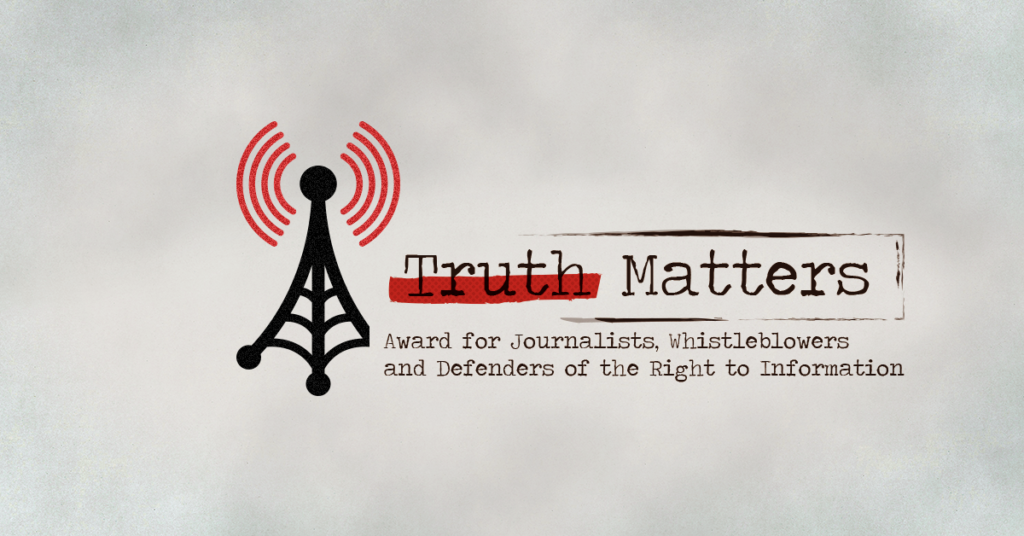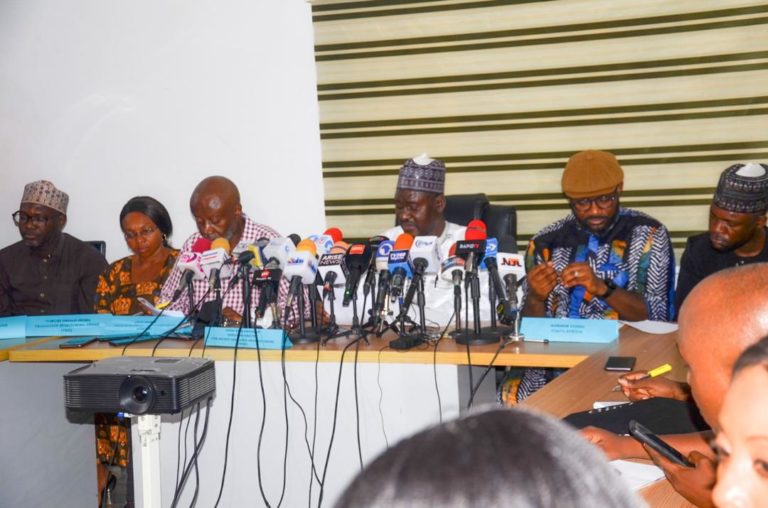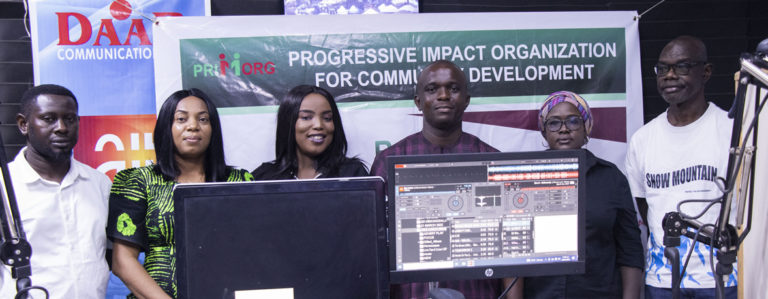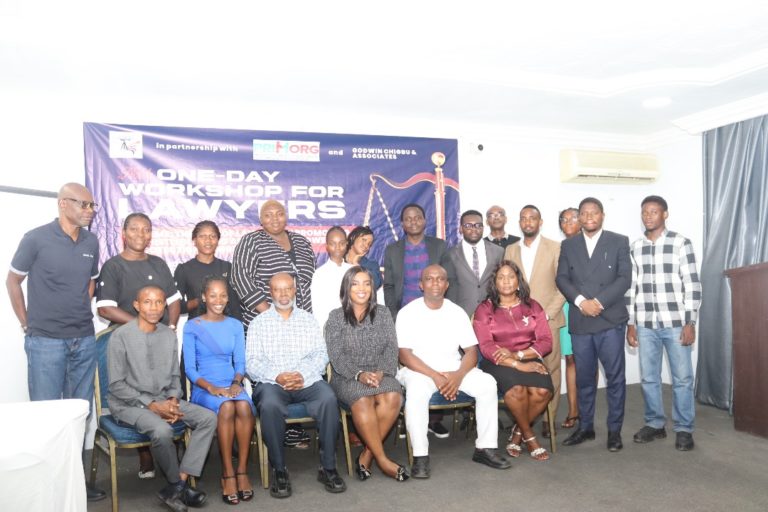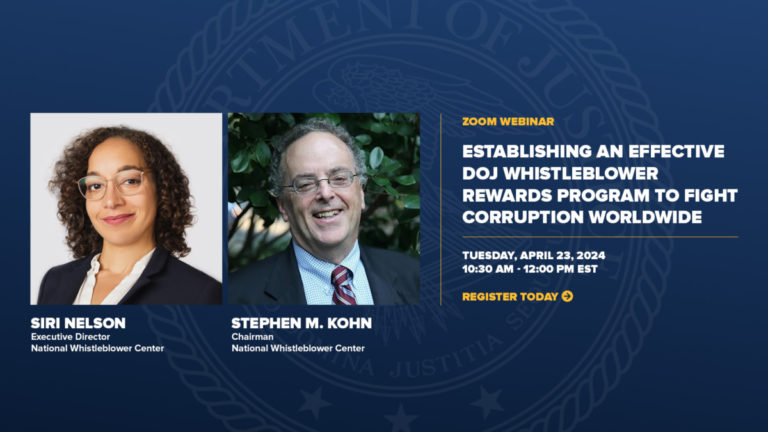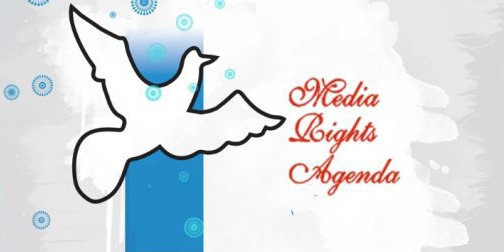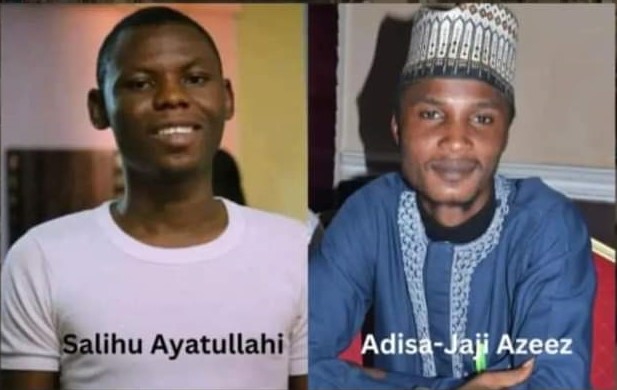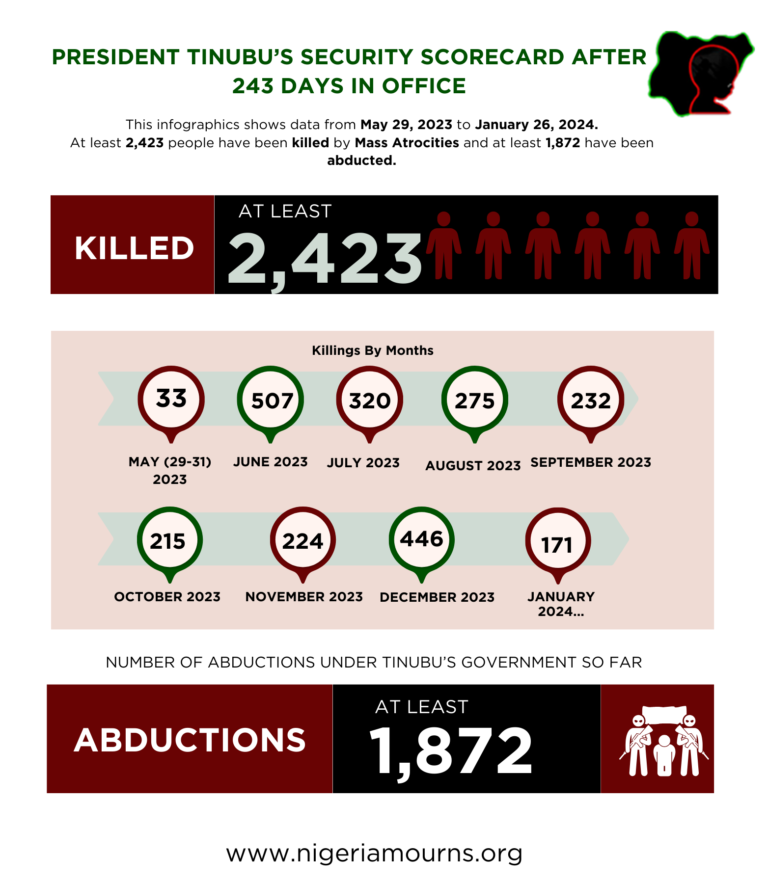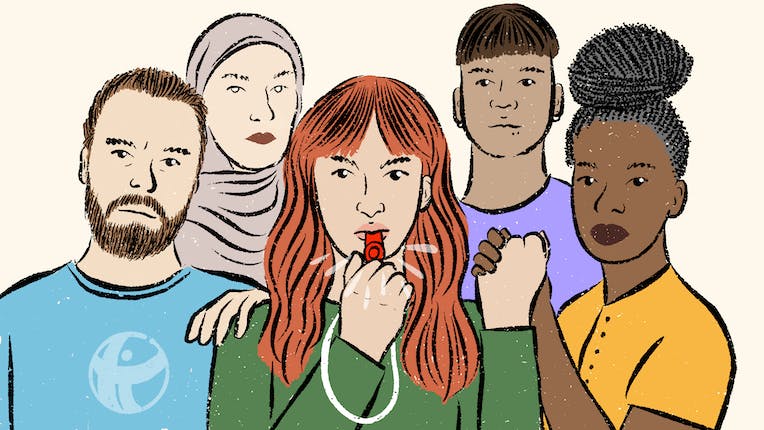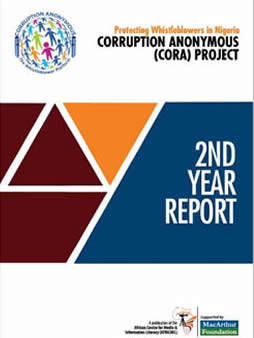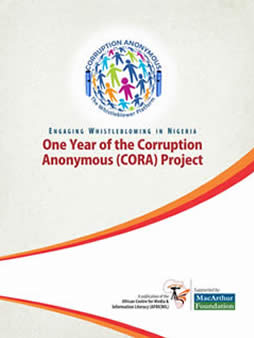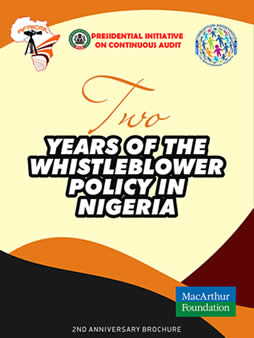By Susan Coughtrie and Anna Myers
This week Unsafe for Scrutiny’s Project Director, Susan Coughtrie, spoke with Anna Myers, the Executive Director of the Whistleblowing International Network (WIN), about the challenges related to whistleblower protection and how these connect into broader concerns regarding attempts to limit public scrutiny, including through the use of legal intimidation and strategic lawsuits against public participation (SLAPPs) in the UK and beyond. Myers also outlined what action the UK Government should take to improve the protections for whistleblowers at a legislative level as well as what journalists can do to help better protect them as their sources.
Susan Coughtrie (SC): WIN has been an active supporter of civic initiatives to address the issue of SLAPPs at a European level, through the Council of Europe and European Union (EU). Can you explain why this topic is so important for whistleblowers and organisations dedicated to protecting them?
Anna Myers (AM): SLAPPs are another tool used to shut down scrutiny and criticism, as other checks and balances on the powerful have been steadily eroded. The importance of this topic was something that immediately hit me when I saw these anti-SLAPP discussions were starting to happen. Not just because whistleblowers have faced their own SLAPP suits, but also because the world of public interest monitoring that is shared by whistleblowers, journalists, activists as well as the NGOs that support them, has clearly been under attack. We are all being similarly undermined and not just by governments. I have been concerned about the growth of corporate power over the 20 years that I have been working in the field. Governments really seem more beholden to corporations than to their citizens now; money influences policy and elections in ways that have changed where the centres of power lie. Over successive decades strong regulatory bodies have been replaced with ‘light touch’ and self-reporting. The rolling back of unions, which would have supported workers to resolve issues in the past and held business and government to account for some of the structural and exploitation problems we are experiencing now, is also a factor. So the options for where whistleblowers can report issues, how these are addressed, has been significantly reduced.
While whistleblowers are typically individuals, journalists used to be part of larger media organisations. But with the demise of traditional media structures, journalists have also become more individualised and therefore more vulnerable to direct attack. In a strange way, whistleblowers and journalists are getting hit together. While not all whistleblowers become journalists’ sources, it is absolutely clear that if journalists are not supported against the powers that want to shut down their stories, then this key route for whistleblowers to let the public know what is going on is at risk. So for WIN and its members, adding our voices to the collective call to end the abusive use of the law to silence those who can call the powerful to account was just obvious from the beginning.
SC: In FPC’s global survey of 63 investigative journalists in 41 countries, conducted last year, one of the resources that respondents identified as the most valuable while reporting on financial crime and corruption, but also the most lacking, was whistleblower protections. Why do you think that is?
AM: The relationship between whistleblowers and journalists has been evolving. It seems to me that journalists are coming to realise they cannot operate as well if whistleblowers do not have some protection. And that such protection is part of protecting the wider information ecosystem that ensures independent journalism can flourish. If you turn to some of the ‘muckrakers’ of old – as I understand it – you found your story, you cultivated and protected your sources and whistleblowers were a bit of a pain in the ass. Sure, whistleblowers might come along once in a while and give you gold dust, but they were hard to work with and told you the story they wanted to be told. Actually, on one level they may not even be asking you to investigate very much. Therefore, the impression was that journalists in the past considered them more trouble than they were worth.
Nowadays there are media platforms asking whistleblowers to ‘please tell us your story’. In part, this may be because journalists do not have the resources they used to have; setting up reporting platforms to receive tips and get information can be a shortcut to a story. Journalists may still prefer the anonymous tip that would allow them to craft their own investigation but I think there is greater understanding, particularly amongst the younger generation of journalists, that some stories are just so complicated and sometimes involve such a vast amount of data that it is impossible to do it alone. There is a natural need for journalists and sources, including whistleblowers to work together and often across borders.
As part of that journalists perhaps see more clearly that they are often the only source of protection for a whistleblower – whether it is in how they tell the story or even when they choose to release it – and that is an enormous responsibility. Stories can and have been told in ways that can really harm the whistleblower. For example, if their identities are revealed too soon or in a way that they can not easily cope with, especially in places where there are few employment or other legal protections. I think more journalists are taking whistleblower protection seriously. Even if whistleblowers are not their sources now, one day they might be.
SC: What are the main concerns and challenges for whistleblowers when it comes to interacting with investigative journalists and sharing their information? And what can investigative journalists do to better improve the protection of those whistleblowers they work with?
AM: Certainly, journalists can and should ensure their communication channels are strong, encrypted and safe. However, at the core of it, I think, are old-fashioned analogue skills – how do you reassure the whistleblower and guarantee that you will not reveal their identity without their consent? How do you build trust and confidence? Most whistleblowers will want to cooperate fully if they feel like something is going to happen. After all, the aim behind blowing the whistle is to change something that is going wrong, but they will need some time to work that out and to trust the journalist will take an independent view. Most whistleblowers are not doing those big data leaks, most are people who need reassurance and classic handling. I think it is really important for journalists to see them as experts, not just as a source of information. Whistleblowers can help provide the other pieces of the puzzle and can be very helpful to journalists in really pulling the whole story together.
Approaching whistleblower protection organisations, like WIN’s members, can help journalists to support their whistleblowers, to understand their responsibilities but also to share the duty of care. It is far too late if you’ve already got close to publishing a story to suddenly go – Oh god, I might be putting somebody at risk! We do get a lot of enquiries, mostly from younger, freelance journalists. They are perhaps not getting the same ‘source handling’ training of old, and do most of their research online, so it’s only later they might become worried they may be putting that whistleblower or source in jeopardy. Ultimately, it’s about understanding the importance of confidentiality, being really clear about what your duties and obligations are to your source, and doing some of that research ahead of time.
SC: Amongst the pledges made by the UK Government at the 2016 London Anti-Corruption Summit was to review the effectiveness and transparency of whistleblower protections in the UK. Seven years later this commitment has not been met. Why do you think the UK Government has not taken more action on whistleblowers?
AM: A lot has changed since 2016 in the UK, there has been Brexit, and a change of government and rising awareness globally of the serious damage wrought by corruption, climate change and now the pandemic. However, whistleblowing is still a topic that can attract a lot of high-profile attention without much long-term commitment for change. It can appear to some to be a topic that gets complicated quickly, especially if you are in a position of power and can foresee how your own decision-making might get called into account. And that is true for any organisation or institution. So there is always some reluctance, or at least some lack of urgency to take the issue much further.
In the UK, it is worth remembering that the Public Interest Disclosure Act (1998) was a Private Members’ Bill and part of the reason it passed was because there were no government pledges for monetary funding. No one in the Government really took responsibility for it. As whistleblowing and the legal protection for whistleblowers have evolved it’s better understood that there does need to be some resources behind it and that organisational accountability for failing to protect whistleblowers needs to be built into the legislation. If organisations continue to only get into trouble for retaliating against one whistleblower at a time, it reinforces the idea that it is just about that one individual. Laws are being adopted, in Australia for example, and in the new EU Directive on Whistleblowing, that are starting to place the onus on the organisation – i.e. that the organisation has a duty of care not only to its workforce but to the public as well.
The Government has already been criticised for not bringing forward a previously promised review of the last employment reforms, made in 2013, into this parliamentary session. There is also an All-Party Parliamentary Group on Whistleblowing that is very strong on reforming the law. But as I said earlier, if governments and most businesses had their way, they would just continue to kick it into the long grass. They need to feel the heat from civil society. It’s like the Freedom of Information Act, they will let it sit there until people get really cross about it and then they might act.
SC: So much has happened with the Julian Assange case in recent years, do you think this has had an impact on the Government’s reluctance to act, as well as, perhaps the public’s understanding of whistleblowing?
AM: I am sure the Julian Assange case is one that the UK Government wishes would go away and they have handled it very badly. He is still stuck in jail, having won his fight against extradition, and it’s terrible. The human toll on him is so high. However, there is a much greater understanding now, if not in the wider public, then at least beyond the ‘expert’ community that Assange is a publisher and that the whistleblowers are people like Chelsea Manning who went to WikiLeaks. Assange changed the face of publishing and was on the cusp of major changes in journalism, he was both feted and condemned by traditional media and it was hard to work out where the traditional lines of whistleblowing, journalism and publishing started and ended. I think we are still grappling with that now. But the attack on Julian Assange is an attack on freedom of expression and a risk to us all.
I’ve always said to colleagues that if it wasn’t Julian it would have been someone else. He arrived at just the right time, when digital technology was changing the face of data sharing and collection, and he challenged government secrecy in a very impressive and public way. Since then we’ve gone through massive technological change, which has impacted the value of information – who owns it and who should control it. Again, this is why so many people are being SLAPPed with these lawsuits – many are those who are not in traditional fields of journalism or publishing, they are bloggers, digital activists, etc. We are even starting to see SLAPPs used as a wholesale strategy to shut down all scrutiny, a tactic that law firms are suggesting to their clients, and casting an ever-widening net of people who should be targeted.
SC: Do you think whistleblowing suffers sometimes from an image problem, with the puritanical idea that whistleblowers must somehow be perfect people in order to be the ones that can blow the whistle?
AM: I think it is obvious why one would want to protect an individual that speaks up for others but the trick is not to over-individualise the risk of speaking up. Part of WIN’s goal is to help build the civil society capacity to make the collective case very quickly, to ensure that the whistleblower is not the only messenger of the public interest message they have delivered. It is much easier to shut down and discredit a single whistleblower than a whole community that agrees with them.
What was evident during the development of the EU Directive on Whistleblowing, is an increase in the number of active groups working alongside whistleblowing advocates to push for greater protections, this includes unions, anti-corruption advocates and independent media protection organisations. To me, this shared understanding is incredibly advanced compared to where we were ten years ago in the NGO world and the same collaboration is evident around the issue of SLAPPs. We all share the same ecosystem and need to work together to defend against shared threats.
This makes networks so important. A good example of how it can work in practice arose with the work of WIN’s associate, the Platform for the Protection of Whistleblowers in Africa (PPLAAF). PPLAAF teamed up with Global Witness to do an anti-corruption investigation in the Democratic Republic of the Congo (DRC), with the cooperation of two local banking whistleblowers. All of them, plus some journalists in Paris and Israel have been subject to legal suits in different jurisdictions. So while the starting point is mining in the Congo, you actually have an international story about corruption with journalists publishing information in different regions, trying to protect their sources until their sources feel able to come out. In fact the two DRC banking whistleblowers did come forward and discovered that in absentia they had been sentenced to death by a DRC court. The idea that if you blow the whistle on suspicions of money laundering you could face a death sentence feels way out there. But from a WIN perspective all of those players are important and ultimately they are all connected. So we have joined forces with our membership to support PPLAAF and Global Witness as well as the two whistleblowers – to highlight the threats they face and show public solidarity for their efforts.
SC: Last week, WIN together with 20 other organisations released a statement condemning the legal tactics utilised by the Eurasian Natural Resources Corporation Limited (ENRC), a privately-owned Kazakh multinational mining company, in what appear to be deliberate attempts to escape public scrutiny. What are WIN’s concerns regarding this case?
AM: The questions the UK Government should be asking itself is ‘Are we being used? And at what point does this threaten the UK’s credibility as an upholder of the rule of law?’ Or at least, recognise that the outrageous nature of these suits has a real impact. It’s similar to the idea that reputational damage can be claimed at the whiff of bad news, and an exaggerated form of what we have all experienced with SLAPPs. That the Serious Fraud Office (SFO) can be sued in this way strikes at the capacity of any law enforcement authority to do its job. To me, the ENRC’s actions should be laughed out of court on all counts, not just against the SFO. However, the problem is that we in the UK have let this get to the point that using the legal system in this way is somehow acceptable. Not only that, but by allowing such claims to go ahead – no matter how lacking in substance – everyone thinks twice about even trying to shine the light on wrongdoing committed by anyone with deep pockets.
It should be obvious that the UK has let the powerful run riot without any appropriate checks and balances. We must ask ourselves, are such legal challenges, such as those put forward by ENRC, a credible response, or merely a distraction tactic from the alleged wrongdoing? Unless we take a ‘public interest’ moment to look at the facts beneath the surface, we miss it. The UK is not doing enough to challenge such abuses of the legal system here in the UK and internationally – especially on the corruption side. Take the Jonathan Taylor case for instance.[1] He is an off-shore oil industry whistleblower stuck in Croatia facing extradition to Monaco after he cooperated with the SFO. Yet the UK Government is not standing up for him by making the connection between the ongoing retaliation against him as a whistleblower and their own credibility as a global leader in the fight against corruption.
SC: What action would WIN and its members like to see from the UK Government to better improve protection for whistleblowers?
AM: Firstly, legal protection against SLAPPs is essential. If we can’t get our act together nationally in law enforcement, especially to deal with cross border criminality and wrongdoing, then we should at least be protecting those people who are doing the work to reveal the facts. Acknowledging that these civil society players – whistleblowers, journalists and human rights defenders – are fulfilling a vital public interest watchdog role that fully complements and enhances the enforcement role that the SFO, the National Crime Agency and others are meant to be fulfilling is an important first step. In the end we can share the information publicly and call for that accountability, but it is law enforcement that needs to take action to prosecute and stop the wrongdoers. So these agencies and the UK Government should view anti-SLAPP measures as an important check on power that protects the environment in which they get the information they need to act.
Secondly, the Public Interest Disclosure Act does need to be refreshed. It did a great job of putting whistleblower protection into the legal framework in a way that I still think is really advanced in some areas. For example, it included protection against gagging clauses, and protected the right to go directly to the party legally responsible for any harm done, whether or not that was the employer. However, much more needs to be done to ensure organisations are doing right by the workforce as well as to the broader public interest. We need to incorporate some of the elements that have found (and are finding) their way into law in Australia and the EU. In particular, that ensures there is accountability for how organisations are operating their whistleblowing systems that is separate from whether or not they breached their legal duties to one particular whistleblower. It should matter to organisations that they learn about problems early enough to do something about it. They shouldn’t wait until they hear it in the press or have to explain what happened because a whistleblower has taken them to court.
Anna Myers is the founding Executive Director of WIN. She has worked in the field of whistleblowing for 20 years – advising individual whistleblowers, employers of all sizes and sectors, and national and international policy makers. Previously the Deputy Director of Public Concern at Work (now called Protect), Anna has also worked at the Group of States against Corruption (GRECO) and at the Government Accountability Project in Washington DC.
[1] WIN, Open Letter to Croatian Minister of Justice: Halt extradition of whistleblower Jonathan Taylor, May 2021, https://whistleblowingnetwork.org/News-Events/News/News-Archive/Open-Letter-to-Croatian-Minister-of-Justice-Extra
This piece was produced as part of the Unsafe for Scrutiny project, which is kindly funded by the Justice for Journalists Foundation.
Source: https://fpc.org.uk/whistleblowers-like-journalists-must-be-protected-as-part-of-the-public-interest-ecosystem/

